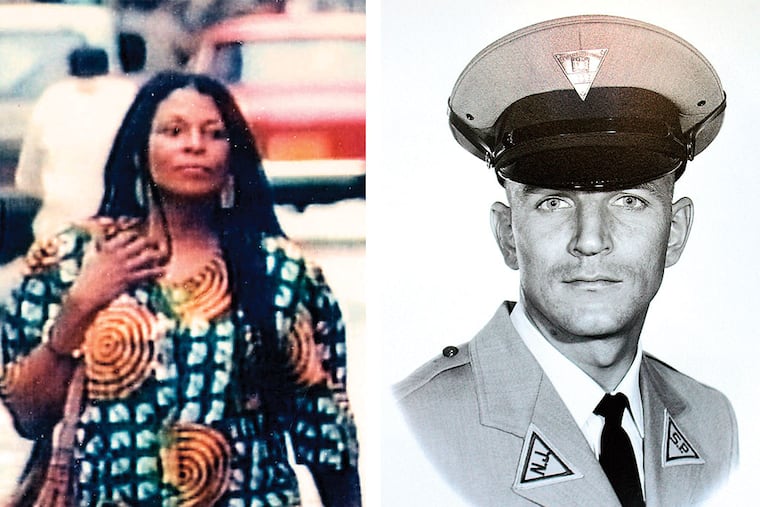Joanne Chesimard accomplice gets parole in trooper’s death
A split New Jersey Supreme Court has granted parole to a former militant convicted in the 1973 death of a New Jersey state trooper.

A split New Jersey Supreme Court granted parole Tuesday to a former militant convicted in the 1973 death of a New Jersey state trooper, in a case that has resonated for decades and been a thorny issue in U.S.-Cuba relations.
Sundiata Acoli is in his mid-80s and had had several parole bids rejected previously. His attorneys argued he has been a model prisoner for nearly three decades and has counseled other inmates.
The state parole board had contended Acoli still is a risk to commit future crimes and hasn’t taken full responsibility for Trooper Werner Foerster’s death.
Acoli’s more-famous co-defendant, Joanne Chesimard, also was convicted and sentenced to a life term but escaped from a New Jersey prison in 1979. Now known as Assata Shakur, she was given asylum in Cuba by then-President Fidel Castro and remains a fugitive.
In a tweet Tuesday, Patrick Colligan, head of the New Jersey State Policemen’s Benevolent Association, called the ruling an “outrage” and “a slap in the face to every officer.”
In Tuesday’s 3-2 ruling with Chief Justice Stuart Rabner not participating, the court held that the state parole board didn’t meet its required burden of demonstrating there was a substantial likelihood of Acoli committing another crime.
“No member of the Court disputes that Acoli committed a horrific crime,” Justice Barry Albin wrote for the majority. “The issue, however is whether Acoli, after nearly five decades of imprisonment, has satisfied the statutory demands that govern his parole eligibility.”
Albin noted that if the crime had occurred today, Acoli would have been sentenced to life without the possibility of parole, but that New Jersey law at the time allowed for parole.
“However despised Acoli may be in the eyes of many because of the notoriety of his crime, he too is entitled to the protection of the law — and to the fair and impartial administration of justice,” Albin wrote.
In a statement, New Jersey Gov. Phil Murphy said he was “deeply disappointed” by the ruling. State Attorney General Matthew Platkin said in a statement, “I am grateful to the attorneys in my office who opposed the release of Sundiata Acoli and I am disappointed that he will be released on parole.”
Soffiyah Elijah, a civil rights attorney who has advocated on behalf of Acoli, praised the ruling and said, “It’s time now for Mr. Acoli to live the rest of his life in the loving care of his family and community.”
Acoli was known as Clark Edward Squire in 1973 when the car he was riding in was stopped on the New Jersey Turnpike for a broken tail light. According to court documents, Acoli’s gun went off during a struggle with Foerster, who had responded as backup.
The state contended Shakur shot Trooper James Harper, wounding him, then took Foerster’s gun and shot him twice in the head as he lay on the ground. A third person in the car with Acoli and Shakur died from his injuries at the scene. The three were members of a group known as the Black Liberation Army.
Acoli has claimed he was grazed by a bullet and blacked out, and couldn’t remember the exact sequence of events. At his most recent parole hearing, in 2016, he speculated for the first time that Foerster could have been shot accidentally by Harper.
In a dissenting opinion, Justices Lee Solomon and Anne Patterson wrote that the parole board’s decision was supported by the evidence and should be left undisturbed.
“Our only role is to ensure that the Parole Board does not abuse its discretion in making decisions,” Solomon wrote. “In light of the Board’s evident consideration of the record as a whole, we cannot say we are in a better position than the Parole Board to decide Acoli’s fate.”
Foerster’s death and Shakur’s continued fugitive status have resonated over the years and spurred bipartisan agreement in Congress.
In 2013, state and federal authorities announced a $2 million reward for information leading to her capture, and the FBI made her the first woman on its list of most wanted terrorists.
President Donald Trump demanded that Cuba return her in 2017 when he announced plans to reverse some Obama-era Cuba policies, an approach that was hailed in New Jersey by Democratic Sen. Bob Menendez and then-Republican Gov. Chris Christie.
In 2005, Castro referred to Shakur as a victim of “the fierce repression against the black movement in the United States” and said she had been “a true political prisoner.”